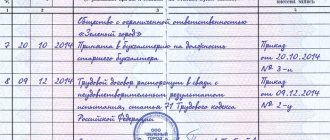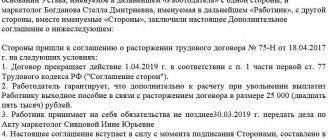What are negative motives?
Police officers can be fired for negative reasons.
Article 58 of the Service Regulations lists the circumstances that do not allow a person to remain in law enforcement:
- the presence of a final conviction against the police officer;
- termination of a criminal case due to amnesty, reconciliation of the parties, expiration of the statute of limitations for bringing a police officer to criminal liability;
- significant disregard for labor discipline standards;
- use of false documents and false information for employment and future career advancement;
- loss of honor and dignity by an officer, committing acts that contradict the legal requirements for the moral character of an employee of internal affairs bodies;
- violation of Russian laws, regulations, instructions of the ministry;
- repeated failure to comply with discipline in the presence of a valid penalty.
Dismissal from the police (formerly the police) for negative reasons is inevitable when committing a criminal offense on the basis of a sentence that has entered into force. If the accused is placed in custody during the preliminary investigation, he will be excluded from the internal affairs bodies on the day of arrest.
The legislator considers the following to be a significant disregard for labor discipline standards:
- failure to comply with the rules for storing and using service weapons and ammunition;
- being on duty after using drugs or being intoxicated;
- absence from work without a valid reason for four hours;
- non-compliance with information storage standards;
- refusal of medical examination required by law;
- refusal to undergo mandatory certification;
- targeted destruction or damage to official property;
- carrying out illegal actions against citizens;
- violation of safety rules that triggered serious consequences - a fire, accident, injury, or provoked the threat of such consequences;
- public negative, insulting statements about members of the government, government officials at any level, and superiors;
- non-compliance with standards for working with material assets and funds;
- refusal to provide citizens with any information related to personal gain;
- non-compliance with contract provisions;
- violation of Russian legislation.
It is inevitable that an employee will be fired for presenting false documents for the purpose of employment or promotion. It does not matter what document we are talking about - a school certificate, a diploma of higher education, a work record book.
The task of police officers is to protect the population, legal entities from criminal attacks and comply with the law. This important mission determines a person’s personal qualities, without which service in the authorities is impossible.
Article 13 of Federal Law No. 342 of November 30, 2011 requires that an employee of internal affairs bodies, on duty and during off-duty hours, behave with dignity, without spoiling the reputation of either his own or the department as a whole. A police officer should not make decisions or take actions aimed at obtaining personal gain.
His actions must be thoughtful, selfless, and fair. The provisions of Article 82 of the above-mentioned law call dismissal the only measure of influence on an employee who has discredited his honor and dignity.
Grounds for dismissal include circumstances that led to a loss of confidence in the employee:
- simultaneously served in the police and was engaged in entrepreneurial activities;
- held a management position in a commercial company whose goal is to make a profit;
- entered false information into the income declaration, concealed the presence of an additional source of profit, property not only of his own, but also of his spouse or minor child;
- violated the law regulating the rules for storing money in foreign bank accounts (the norm applies to the spouse and minor children of a police officer);
- is a member of the board of a foreign non-profit organization operating in Russia;
- extracts self-interest and personal gain from the situation that has developed in the service;
- knows (may know) about the selfish actions and personal interests of the subordinate, but does not stop his activities.
An employee can be dismissed on such grounds only if there is direct intent, established during an internal audit or by a court verdict.
Job loss is threatened for violations of contractual obligations associated with the employee’s lack of the necessary education, failure to fulfill job duties, abuse of official position, or ignoring job descriptions.
I quit the Ministry of Internal Affairs, where can I get a job?
→ → August 5, 2010 at 6:05 pm+1 I have 7.5 years of operational experience, I worked as a criminal investigation officer, but the salary was just meager, and the working hours were irregular, so I had to quit, and now I’m looking for work, but alas, I don’t understand where to start, who can I be?
August 5, 2010 at 6:170 pm Arina 007, wow, interesting question.
I think men would go to security, but a woman.
What else can you do besides this?
(topic author) August 5, 2010 at 6:400 pm I’ll say this: I was searching for missing people and looking for swindlers who had fled from the investigative bodies of the court and the prosecutor’s office, so I don’t know, in general I’m a very active person, I grasp everything on the fly, to learn even in another the profession is ready, the main thing is a good mentor for a short period of time and strictly limited responsibilities
In what cases will they be hired to work for the police after dismissal for negative reasons?
In case of limited health status, also established by the commission.
This clause provides for the employee’s inability to fully perform his duties as provided for in the job description and cannot be transferred to another position; During the employee certification process, his performance inadequacy was established; For gross violation of labor discipline; For violation of the norms of the current legislation, incompatible with the continuation of work in the internal affairs department due to the inconsistency of his personal qualities with the requirements put forward to employees; Upon entry into force of a court conviction, termination of proceedings due to the expiration of the statute of limitations, reconciliation of the parties; When sent to military or alternative service; For repeated violations of labor discipline.
The procedure for dismissing an employee from internal affairs bodies
Dismissal due to an offense that discredits the honor of a police officer, malicious violation of discipline, or other negative grounds is possible only after the completion of a special internal investigation.
During the investigation, the fact of the violation, the involvement of a certain employee, and the degree of guilt are established. The conduct of an internal investigation is regulated by the provisions of the Instruction on the procedure for organizing and conducting internal audits in internal affairs bodies.
Upon completion of the inspection, a conclusion is drawn up. It takes into account the conditions under which the act was committed, its severity, the reputation of the police officer, previous merits, and awareness of guilt. The resolution indicates the qualification of the offense and the name of the penalty applied.
The employee is familiarized with the order, and, if necessary, with the conclusion and materials of the inspection. From this moment the penalty is considered imposed. Two months before dismissal from service, the employee is given a notice containing his personal data, the reason and date of dismissal, due payments, information about the performer, his signature and seal.
The document is handed over against signature. The personnel service prepares a submission from the internal affairs bodies and submits it to management for consideration. Measures are being taken to remove the employee from the federal register.
The employee is introduced to the text of the presentation. A corresponding entry is made in the work book indicating the exact period of service. Upon dismissal, the medical insurance policy remains with the employee; there is no need to hand it over.
Dismissal is a legal process that involves respecting the rights of a citizen. The employer must hand him a work book on the last working day and make the payments due, regardless of the reason for dismissal. Additionally, the employee is given a certificate of income, a certified copy of the dismissal order, medical examination reports, and acts (if available).
Free legal assistance
/ / If you were fired under an article for lack of trust from the Ministry of Internal Affairs, where can you get a job? When you change jobs, the problem will arise again, but the dismissal under an article will be covered by a new entry, and getting good recommendations for acquaintance will not be difficult. The third option, the most honest, but also the most difficult, is to look for a job, go to interviews and hope that one day the employer will accept the applicant for who he is.
And in this case, a number of questions again arise: what to do so as not to receive refusals at the first contact with the employer, how to behave during an interview, how to explain the reason for dismissal under the article. Everyone finds their own way out of the situation.
Some work outside their specialty, while at the same time looking for a suitable job. One worker gets a job through an acquaintance, covering up the ill-fated entry in the employment record, another gets rid of this employment record altogether, taking risks, the third goes through many interviews.
Is there a pension?
Upon dismissal from the internal affairs bodies or the army, a statement is drawn up with a mandatory indication of the reason for dismissal, length of service, benefits and social guarantees.
Leaving service for negative reasons if you have the required length of service does not affect the assignment of a long-service pension.
An exception to this rule occurs when, before a pension is granted, an employee is found guilty of committing a crime and, as a punishment, is deprived of a special rank. If at the time of dismissal the length of service has been partially earned, then the right to receive a pension does not arise.
It is not permitted to terminate the payment of an already earned long-service pension due to deprivation of a special rank for a crime committed after leaving law enforcement service. This is confirmed by judicial practice and decisions of the Constitutional Court.
Dear readers! To solve your problem right now, get a free consultation
— contact the on-duty lawyer in the online chat on the right or call:
+7
— Moscow and region.
+7
— St. Petersburg and region.
8
- Other regions of the Russian Federation
You will not need to waste your time and nerves
- an experienced lawyer will take care of solving all your problems!
What payments are included in the calculation?
Based on the “Regulations on monetary compensation for employees of the Department of Internal Affairs of the Russian Federation,” we can conclude that the calculation is carried out according to the following points:
- Full-time employees are paid compensation for all days worked before the date of dismissal.
- If an employee is on vacation, payments are accrued until the day the vacation ends.
- Employees undergoing treatment are accrued until the date of their return to service.
Is there compensation for unused vacation? If an employee has not taken his leave before January 1 of the year of dismissal, he receives full compensation, regardless of the grounds for dismissal.
Dismissal payments have some nuances:
- An employee who has served for 20 years or more receives severance pay in the amount of 7 salaries.
- Employees with less than 20 years of experience receive a salary according to a special rank for a year.
- The worker also receives compensation for hours worked, unrealized days off, etc.
Payments are made in accordance with position and length of service.
In addition to basic payments, a one-time payment in the amount of 2,000,000 rubles is made for dismissal due to health reasons.
Are there any uniform payments upon dismissal? Currently, compensation is also paid for uniforms , but only for the period of service in the police.
The amount of such payment must be previously agreed upon with the authorities and indicated in the order.
Appeal against termination of employment relationship
The decision to dismiss for negative reasons can be challenged in court.
The following are considered strong arguments for reinstatement:
- bringing an employee to disciplinary action while on sick leave;
- violation of deadlines for issuing a penalty or dismissal;
- non-compliance with the methodology for performing an internal audit, the dismissal procedure and the rules for drawing up related documents;
- management’s reluctance to familiarize the dismissed employee with all the materials of the audit conducted against him;
- disciplinary action is not commensurate with the gravity of the act.
A statement of claim must be filed with the court at the location of the employer, containing information about the applicant and the defendant, and the reasons for disagreement with the dismissal. It is advisable to attach supporting documents to the document. The period for appealing the manager’s illegal decision to dismiss for negative reasons is one month. The period is calculated from the date of receipt of the order.
Dear readers, the information in the article may be out of date, take advantage of a free consultation by calling: Moscow +7
, St. Petersburg
+7 (812) 425-62-38
, Regions
8800-350-97-52











